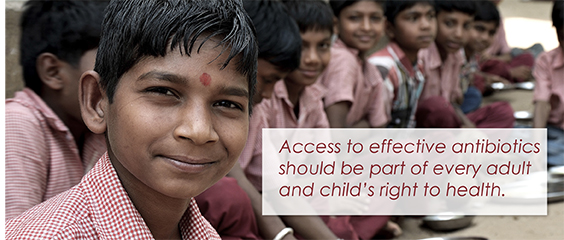2016-10-26
4 July 2016
Antibiotic resistant bacteria are spreading at an alarming rate and some bacterial infections may once again be untreatable. Antibiotic resistance (ABR), conservatively calculated, causes more than 500 000 deaths every year. This number is projected to rise dramatically if radical actions are not taken. Lack of effective antibiotics, diagnostics and vaccines threatens the health of millions and hampers fulfillment of several of the Sustainable Development Goals. Access to effective antibiotics should be part of every adult and child’s right to health.
ReAct held briefings for UNICEF headquarters
ReAct held a series of briefings at the UNICEF’s headquarters in New York, USA, on the connection between antibiotic resistance and some of the major topics the organization covers, namely health, nutrition and water, sanitation and hygiene (WASH). ReAct provided the participants with sets of options for action spanning from mainstreaming ABR into their existing activities to facilitation of intersectorial collaboration to ensure implementation of actions on antibiotic resistance on a national level and scaling-up education and awareness raising activities.
One third of neonatal sepsis deaths linked to resistant pathogens
ABR strikes hardest on the most vulnerable, such as mothers and children in resource-poor settings, and threatens to undo gains made in this field over the last decades. Globally, it is estimated that 214 000 neonatal sepsis deaths annually – more than a third of the total number of deaths – are attributable to resistant pathogens. At the same time, targeted access to antibiotics could avert approximately 445 000 community-acquired pneumonia deaths in children aged younger than 5 years. Therefore both resistance and lack of access to effective antibiotics contribute to the disease burden.
Improved WASH could decrease diarrhea deaths in children under five
From a prevention angle, universal access to improved water, sanitation and hygiene in some countries could cut the overwhelming burden of diarrhea, a major global under 5 killer, by 60%. As many diarrheal cases are treated with antibiotics, in many cases inappropriately, this would also reduce antibiotic use. Early clinical interventions introducing Oral Rehydration Salts coupled with zinc supplementation have the potential to reduce unnecessary use of antibiotics as well.
Fact sheets on nutrition, child health and WASH
ABR is a major obstacle in health system strengthening and quality of care improvement efforts in maternal and child health and beyond. ReAct has developed three factsheets containing burden data illustrating the magnitude of the issue and its impact on the work of stakeholders addressing health, nutrition and WASH. These are coupled with a brief overview of the global ABR policy landscape and importantly, provide tailored options for action in respective areas.
The fact sheets are named:
– Antibiotic resistance – undoing progress in maternal and child health
– Antibiotic use, resistance and the link to nutrition
– Addressing the antibiotic resistance threat – the role of water, sanitation and hygiene.
Options for action on antibiotic resistance include
- The Global Action Plan on Antimicrobial Resistance urges countries to develop National Action Plans on Antimicrobial Resistance. Stakeholders with a strong national presence are uniquely positioned to facilitate the inter-sectorial collaboration and provide the expert advice needed to ensure implementation of actions on ABR.
- Advocate for development of affordable quality antibiotics, vaccines and diagnostics.
- Work to enhance equitable access to quality antibiotics simultaneously with conservation efforts.
- Support development of evidence-based antibiotic guidelines and monitor adherence to guidelines and recommendations from international organizations, such as WHO.
- Efforts to fight malnutrition, improve food security and improve WASH have direct positive effects on limiting ABR development and spread, and on quality of care.
The fact sheets are freely shareable and we encourage you to use them for advocacy and educational purposes. The three perspectives addressed in the factsheets are closely interlinked and reflect the need for multi-sectorial action on ABR.

